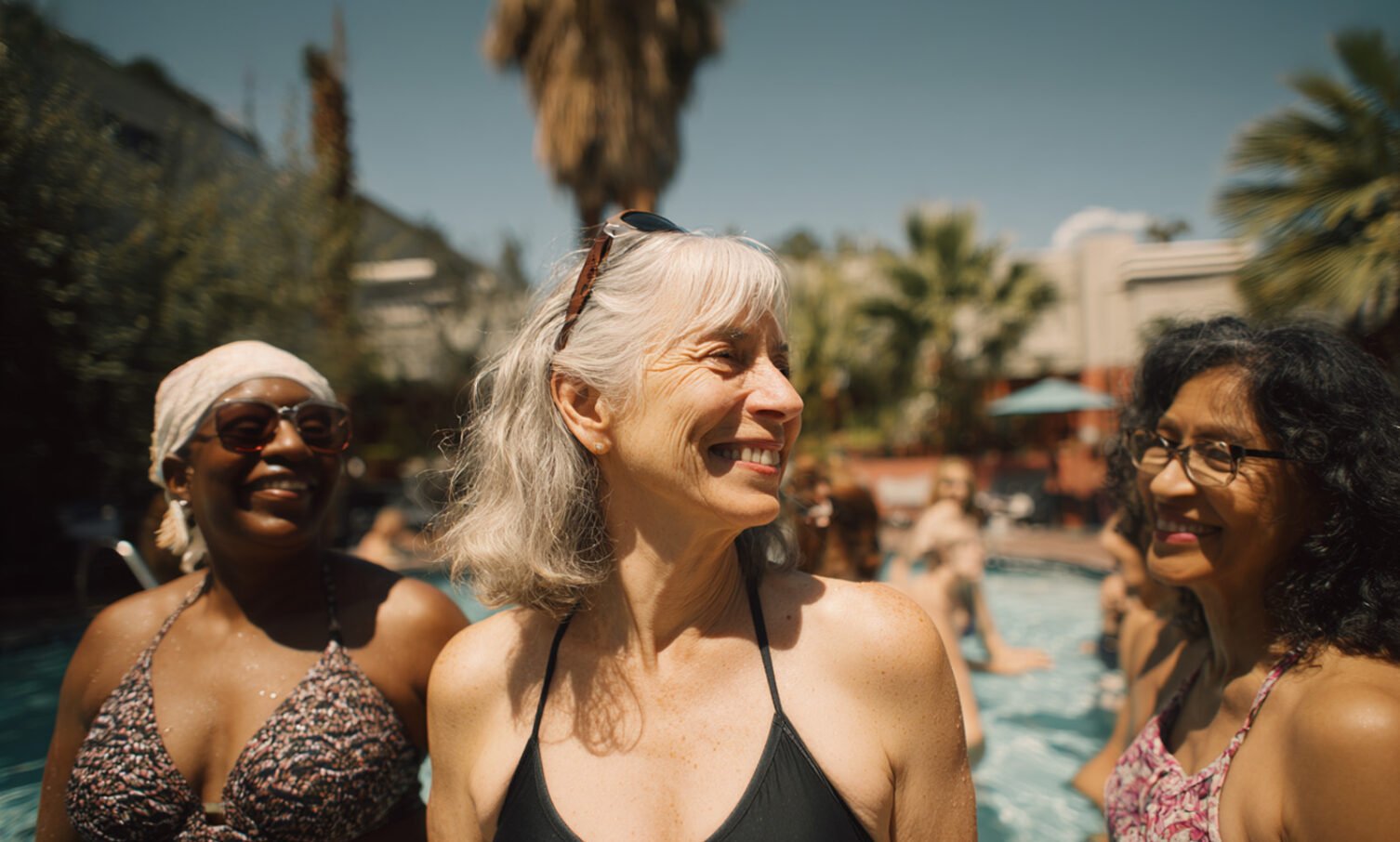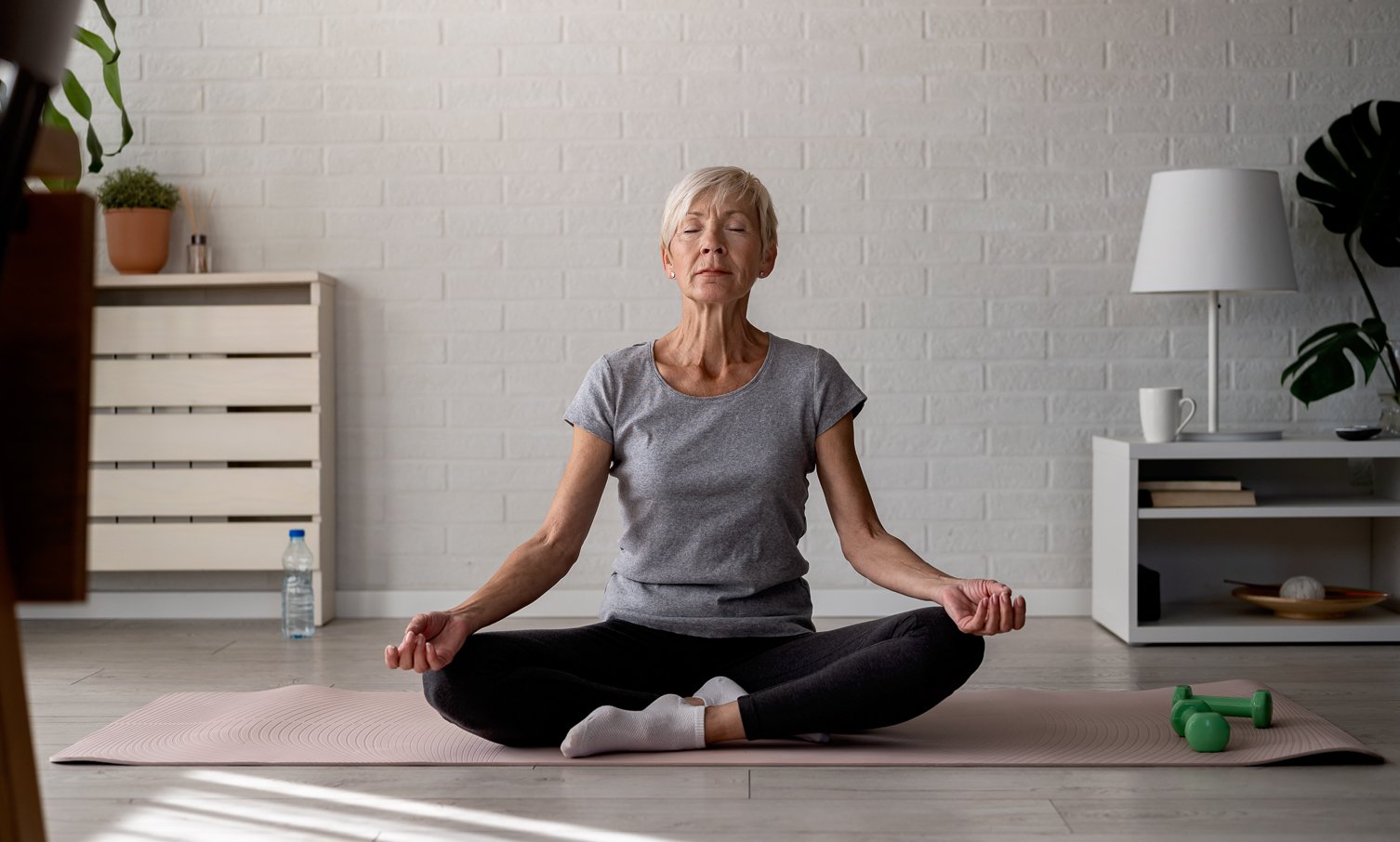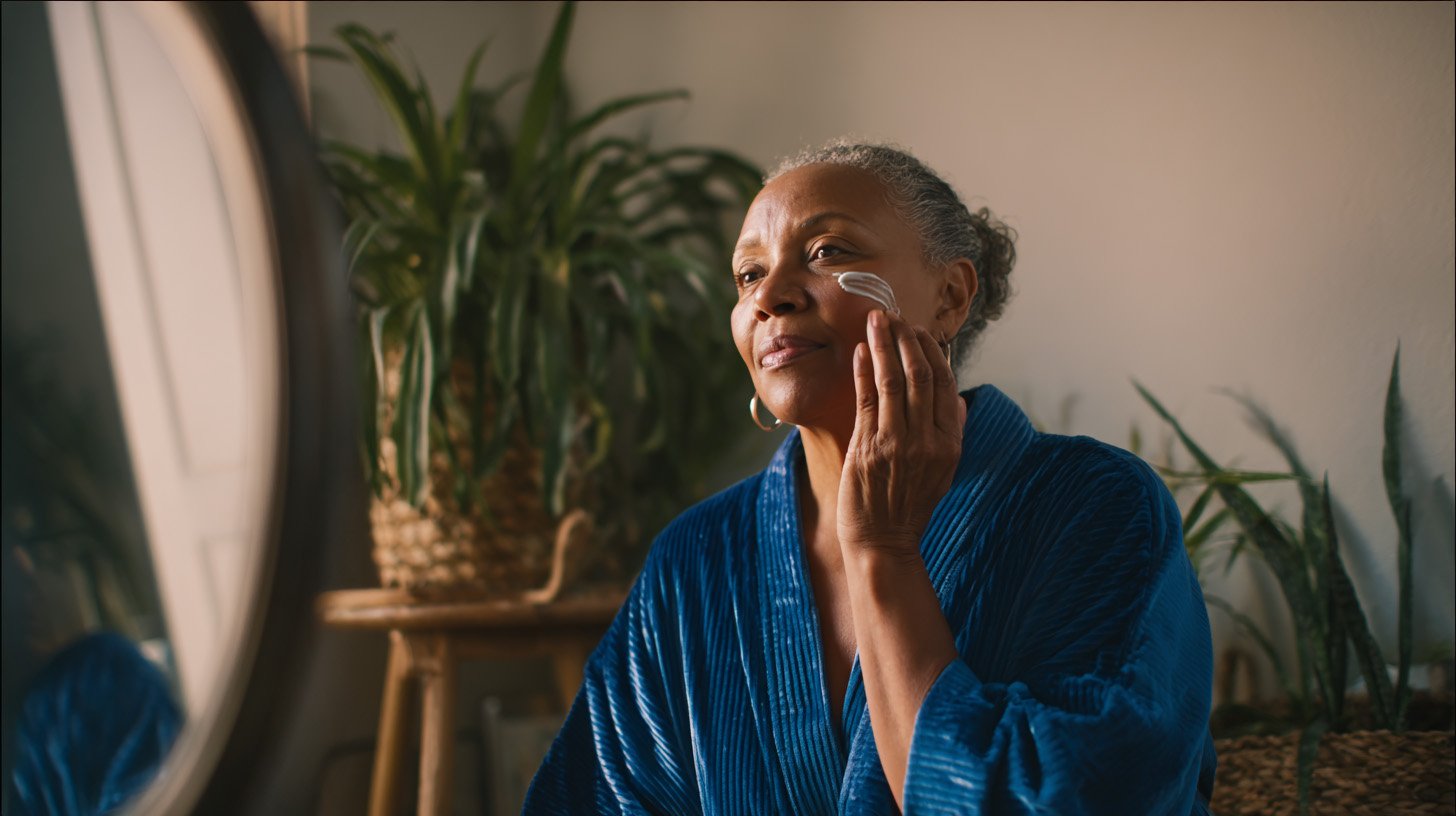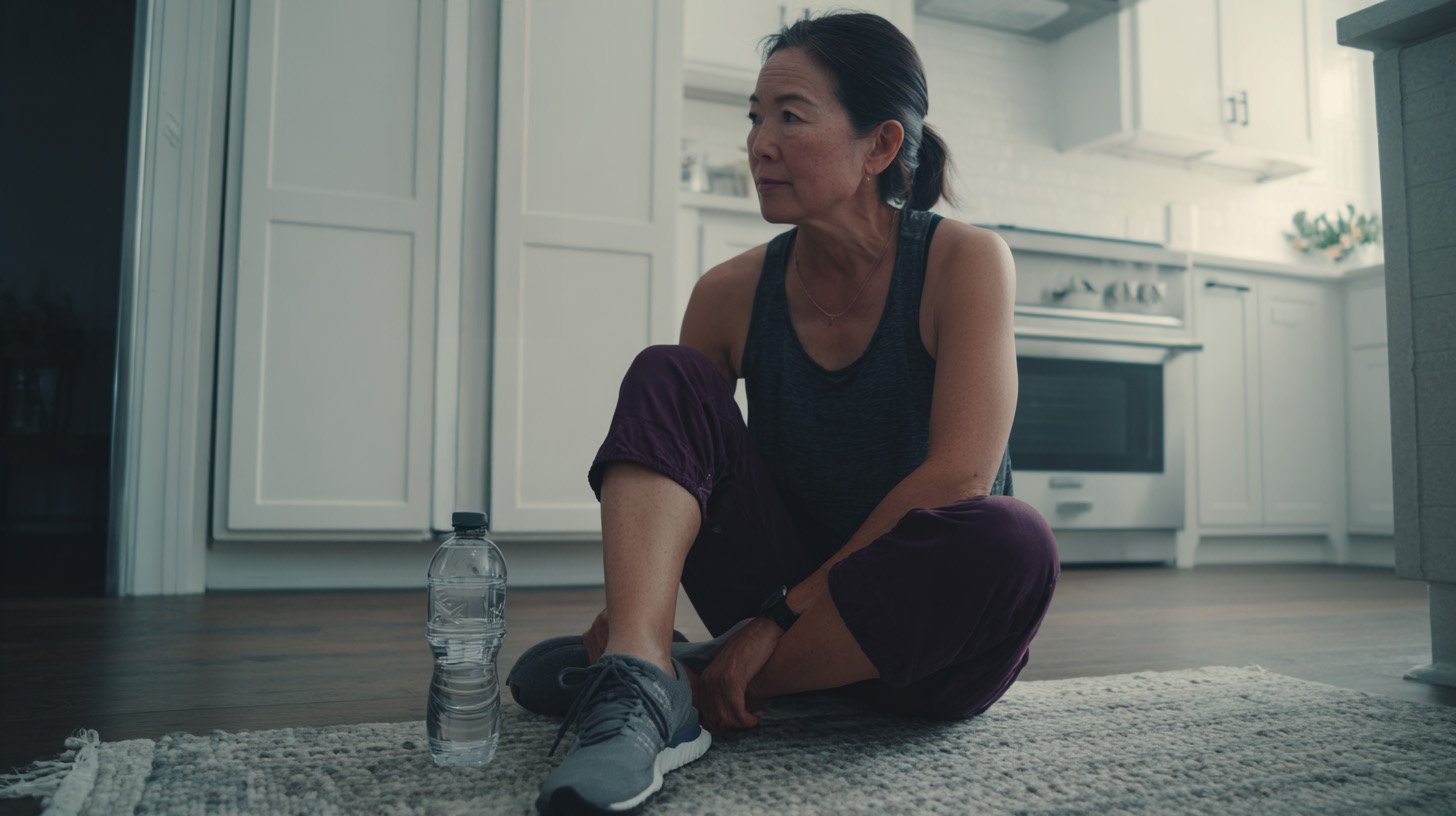Menopause Skin SOS: Science, Solutions, and Self-Care
Reading time 10 min

Reading time 10 min

Skin is one of our largest organs, and yes, it’s an organ! It protects us, regulates temperature, and even helps maintain hydration. As we age, our skin is often the first to show visible signs, acting like a mirror reflecting internal changes we otherwise wouldn’t see.
During perimenopause, about 80% of women notice changes in their skin, but only about half feel informed enough about what’s happening1, 2, 3.
What causes menopause skin changes?
Estrogen loss during menopause leads to lower collagen, elastin, hydration, and blood flow – causing dryness, sagging, and dullness. These shifts affect 80% of women but are often under-recognized.
Estrogen plays a crucial role in maintaining healthy skin. It keeps skin plump, elastic, and hydrated. Let’s explore what significant skin changes occur when estrogen levels drop during perimenopause and postmenopause.
Collagen is a key protein responsible for skin firmness and elasticity. It decreases dramatically – approximately 30% within the first five years after menopause, continuing at about 2% per year afterward.
This decline is primarily linked to estrogen loss, resulting in thinner, more fragile skin prone to sagging and wrinkling. Research comparing premenopausal and postmenopausal women confirmed significant decreases in collagen types I and III linked directly to estrogen deficiency4, 5.
Elastin, essential for skin flexibility, degrades more rapidly post-menopause, causing increased sagging and wrinkles. Elastin also plays a critical role in wound healing and overall skin resilience6, 7.

Estrogen supports glycosaminoglycans (GAGs) – molecules that retain water in the skin. Reduced estrogen levels diminish these molecules, leading to increased dryness, itchiness, and roughness8.
Decreasing estrogen levels result in fewer capillaries and decreased blood flow, giving the skin a duller appearance and impairing wound healing9, 10.
During perimenopause, subtle dryness, early fine lines, and occasional acne can appear due to hormonal fluctuations11. Postmenopause typically brings more noticeable and persistent changes:
Scientific studies have identified several strategies for effectively managing menopausal skin changes: Hormone Replacement Therapy (HRT), retinoids, and antioxidants.
Systemic HRT can significantly increase collagen, skin thickness, and elasticity if initiated early post-menopause. However, HRT is primarily prescribed for menopausal symptoms and osteoporosis prevention due to potential risks such as breast cancer and cardiovascular disease.
Topical Estrogen creams applied to the skin can safely boost collagen and elasticity locally, but they are not yet widely used and require medical oversight. Typical effective concentrations used in studies range from 0.01% to 0.1% estradiol or estriol formulations.

Clinical trials have shown benefits after consistent use for at least 3 to 6 months, applied usually once daily. Currently, topical estrogen creams are approved for vaginal atrophy. Their use for facial skin rejuvenation is not approved anywhere yet12, 13, 14.
Topical retinoids have clinical support for combating skin aging. They might increase collagen production, reduce wrinkle depth, and improve skin thickness – all things many of us start craving in our 40s and beyond15.
Retinol and retinaldehyde products (typically 0.1% to 1%) can also be effective, especially when used consistently. Start low and go slow: menopausal skin can be more sensitive. Begin with a lower strength and use it 2–3 nights per week.
Layer a moisturizer over it, or use the “sandwich method” (moisturizer, retinoid, moisturizer again plus sunscreen) to buffer irritation. Studies show visible improvements after 12 weeks, with more noticeable changes after 24 weeks of regular use.
Antioxidant-rich skincare can help neutralize free radicals that accelerate skin aging. Clinical effectiveness can vary significantly based on formulation and skin type16, 17.
Formulation matters – a stable pH and proper packaging (e.g., opaque, air-tight bottles) are key to maintaining potency.
In a double-blind, randomized trial, women were treated with either topical estrogen (estradiol) or plant-derived isoflavones, and they didn’t know which one they were using. After 24 weeks, 88% of women using estrogen reported skin improvements, compared to just 50% in the isoflavone group18.
Lifestyle and nutrition influence how skin ages – especially during menopause. Here’s what research currently supports.
A diet with enough protein, omega-3s, and antioxidants supports skin repair and collagen production. These nutrients also help counteract oxidative stress, which speeds up aging. Think: fish, flaxseed, berries, and leafy greens19.
Randomized, placebo-controlled studies suggest daily intake of hydrolyzed collagen peptides (typically 2.5–10g/day) over 8–12 weeks may improve skin hydration, elasticity, and dermal collagen density. Effects are modest and vary by individual20, 21.
While drinking more water won’t directly “hydrate” the skin, dehydration can exacerbate skin dullness. Maintaining adequate hydration supports general skin health.

Daily use of a broad-spectrum SPF 30+ sunscreen helps prevent further collagen degradation and hyperpigmentation. Use sunscreen every day, even if it’s cloudy. Estrogen-deficient skin is more vulnerable to UV damage, so daily sun protection is non-negotiable22.
Moderate exercise has been associated with improved skin structure and microcirculation in older adults. While no direct link to menopausal skin aging has been established, the indirect benefits (e.g., circulation, inflammatory control) make it worthwhile23, 24.
Chronic sleep deprivation and stress don’t just affect how you feel – they impair your skin’s ability to repair and retain moisture. Both increase cortisol, which might slow barrier repair and lead to more water loss through the skin. Prioritizing rest and stress reduction isn’t a luxury. It’s essential for keeping your skin resilient25.
Estrogen loss during menopause doesn’t just affect your cycle – it rewires how your skin behaves. Collagen drops. Hydration shifts. Healing slows. That’s not a vanity issue – it’s a biological one.
These changes are measurable and backed by decades of research. Skin is adapting to a new hormonal environment. And while we can’t reverse menopause, we can work with our biology, not against it.
The good news? You don’t need a 12-step routine or magic serum (I wish it existed!). What you need is a solid skin care foundation, realistic expectations, and the willingness to treat your skin like the evolving organ it is.
Skin during menopause isn’t broken – it’s changing. And change, when met with the right tools, can still mean strength, resilience, and radiance.
Dr. Jūra Lašas
1.
Raine-Fenning, J. et al. Skin Aging and Menopause. (2003) https://doi.org/10.2165/00128071-200304060-00001
2.
Farage, M. et al. Degenerative Changes in Aging Skin. (2015) https://doi.org/10.1007/978-3-642-27814-3_4-2
3.
Ganceviciene, R. et al. Skin anti-aging strategies. (2012) https://doi.org/10.4161/derm.22804
4.
Calleja-Agius, J. et al. Skin connective tissue and ageing. (2013) https://doi.org/10.1016/j.bpobgyn.2013.06.004
5.
Affinito, P. et al. Effects of postmenopausal hypoestrogenism on skin collagen. (1999) https://doi.org/10.1016/S0378-5122(99)00077-8
6.
Baumann, L. et al. Clinical Relevance of Elastin in the Structure and Function of Skin. (2021) https://doi.org/10.1093/asjof/ojab019
7.
Wen, Q. et al. Trends in Biotechnology. (2020) https://doi.org/10.1016/j.tibtech.2019.08.005
8.
Raine-Fenning, J. et al. Skin Aging and Menopause. (2012) https://doi.org/10.2165/00128071-200304060-00001
9.
Thornton, M. The biological actions of estrogens on skin. (2002) https://dx.doi.org/10.1034/j.1600-0625.2002.110601.x
10.
Thornton, M. Estrogens and aging skin. (2013) https://doi.org/10.4161/derm.23872
11.
Raine-Fenning, J. et al. Skin Aging and Menopause. (2003) https://doi.org/10.2165/00128071-200304060-00001
12.
Sator, P. et al. The influence of hormone replacement therapy on skin ageing. (2001) https://doi.org/10.1016/S0378-5122(00)00225-5
13.
Pivazyan, L. et al. Skin Rejuvenation in Women using Menopausal Hormone Therapy: A Systematic Review and Meta-Analysis. (2023) https://doi.org/10.6118/jmm.22042
14.
Phillips, T. et al. Does hormone therapy improve age-related skin changes in postmenopausal women? (2008) https://doi.org/10.1016/j.jaad.2008.05.009
15.
Zapała, M. et al. The use of retinoids in the treatment of skin lesions and prevention of signs of skin aging – a systematic review. (2023) https://doi.org/10.3390/ijms232012622
16.
Miquel, J. et al. Menopause: A review on the role of oxygen stress and favorable effects of dietary antioxidants. (2006) https://doi.org/10.1016/J.ARCHGER.2005.08.005
17.
Kurutas, E. The importance of antioxidants which play the role in cellular response against oxidative/nitrosative stress: current state. (2015) https://doi.org/10.1186/s12937-016-0186-5
18.
Moraes, A. et al. The effects of topical isoflavones on postmenopausal skin: Double-blind and randomized clinical trial of efficacy. (2009) https://doi.org/10.1016/j.ejogrb.2009.04.007
19.
Michalak, M. Bioactive Compounds for Skin Health: A Review. (2021) https://doi.org/10.3390/nu13010203
20.
Sangsuwan, W. Four-weeks daily intake of oral collagen hydrolysate results in improved skin elasticity, especially in sun-exposed areas: a randomized, double-blind, placebo-controlled trial. (2020) https://doi.org/10.1080/09546634.2020.1725412
21.
De Miranda, R. et al. Effects of hydrolyzed collagen supplementation on skin aging: a systematic review and meta‐analysis. (2021) https://doi.org/10.1111/ijd.15518
22.
Iannacone, M. Effects of sunscreen on skin cancer and photoaging. (2014) https://doi.org/10.1111/phpp.12109
23.
Sánchez-García, J. et al. Physical Exercise and Dietary Supplementation in Middle-Aged and Older Women: A Systematic Review. (2023) https://doi.org/10.3390/jcm12237271
24.
Oizumi, R. et al. The Potential of Exercise on Lifestyle and Skin Function: Narrative Review. (2024) https://doi.org/10.2196/51962
25.
Xerfan, E. et al. Can good sleep quality enhance the benefits of oral collagen supplementation in the prevention of skin aging? (2025) https://doi.org/10.1007/s00403-025-03860-5